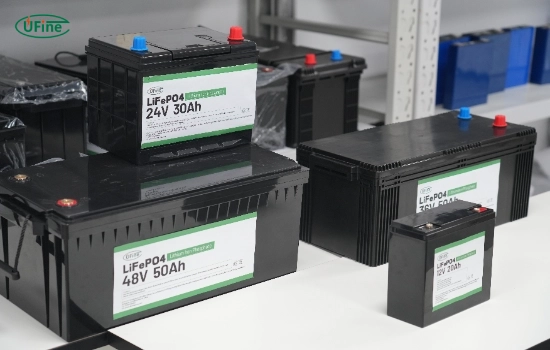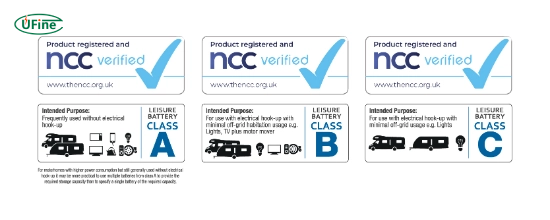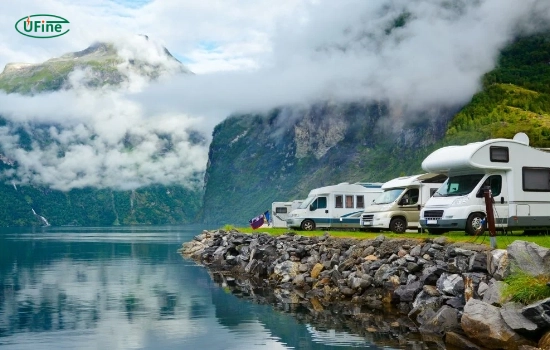Leisure batteries play a crucial role in enhancing the camping and traveling experience in caravans and motorhomes. Among the various types available, Class A leisure batteries stand out for their capacity and efficiency, particularly for those who venture off the beaten path. This guide will explore the intricacies of Class A leisure batteries, including their types, benefits, maintenance, and selection criteria, ensuring you have all the information needed to make an informed choice.
Part 1. What is a leisure battery?
Leisure batteries power 12V appliances in caravans, motorhomes, and other recreational vehicles. Unlike standard car batteries that deliver a quick burst of energy to start an engine, leisure batteries provide a steady current flow over extended periods. This feature makes them ideal for powering devices such as lights, refrigerators, and other electrical appliances while camping or traveling.
Characteristics of Leisure Batteries
- Deep Cycle Design: Leisure batteries fit into the deep cycle category, allowing multiple discharges and recharges without significant damage.
- Low Current Output: They emit low currents over a prolonged period, making them suitable for continuous use.
- Durability: Manufacturers design leisure batteries to withstand the rigors of outdoor use, including temperature fluctuations and vibrations from travel.
Part 2. Types of leisure batteries
Several types of leisure batteries are available, each with unique features and advantages. The most common types include:
- Lead-Acid Batteries: These traditional batteries come in two varieties: flooded and sealed. They are affordable but heavier and have a shorter lifespan than newer technologies.
- AGM (Absorbent Glass Mat) Batteries: AGM batteries are sealed lead-acid batteries with better performance and safety. They can be mounted in various positions and remain maintenance-free and resistant to vibrations.
- Gel Batteries: Similar to AGM, gel batteries use a silica gel to immobilize the electrolyte, making them spill-proof and safer for use in confined spaces.
- Lithium Iron Phosphate (LiFePO4) Batteries: These are the latest technology in leisure batteries. They are lightweight, have a longer lifespan, and can be discharged more extensively without damage. Although more expensive, their efficiency and longevity make them popular among serious campers.
Part 3. Understanding the NCC verified leisure battery scheme
The NCC Verified Leisure Battery Scheme is an initiative to ensure that leisure batteries meet specific performance and safety standards. This scheme gives consumers confidence in the quality and reliability of leisure batteries. Batteries that pass the NCC’s rigorous testing are marked with a certification label, indicating they are suitable for caravans and motorhomes.
Benefits of the NCC Verified Scheme
- Quality Assurance: The scheme ensures that batteries meet high performance and safety standards, reducing the risk of failure during use.
- Consumer Confidence: Knowing that a battery is NCC verified gives consumers peace of mind when purchasing.
- Industry Standards: The scheme promotes best practices within the industry, encouraging manufacturers to produce high-quality products.
Part 4. Why choose class A leisure batteries?
Class A leisure batteries cater to users who frequently travel off-grid and need a reliable power source for extended periods. Here are some compelling reasons to opt for Class A leisure batteries:
- High Capacity: Class A batteries typically offer a larger storage capacity, making them suitable for powering multiple devices simultaneously.
- Extended Lifespan: With proper care, Class A leisure batteries can last significantly longer than their counterparts, providing better value over time.
- Efficiency: These batteries charge faster and maintain their performance even under heavy loads, ensuring you have power when needed.
Part 5. Appliances supported by class A batteries
Class A leisure batteries can support various appliances, making them versatile for multiple camping and traveling needs. Some common appliances include:
- Refrigerators: Essential for keeping food and drinks cold, especially during long trips.
- Lighting: LED lights and other lighting systems can be powered efficiently, enhancing visibility and comfort.
- Water Pumps: For those with onboard water systems, leisure batteries can power pumps for fresh water and wastewater.
- Heating Systems: Portable heaters or heating systems for caravans can be powered to ensure comfort during colder months.
- Entertainment Systems: TVs, radios, and other entertainment devices can also be powered, making your travels more enjoyable.
Part 6. Comparing class A, B, and C leisure batteries
When choosing a leisure battery, it’s essential to understand the differences between Class A, B, and C batteries. Here’s a comparison to help clarify:
|
Feature |
Class A |
Class B |
Class C |
|
Capacity |
High (100Ah and above) |
Medium (50-100Ah) |
Low (Less than 50Ah) |
|
Lifespan |
Long (up to 10 years) |
Moderate (5-7 years) |
Short (3-5 years) |
|
Weight |
Heavier due to higher capacity |
Moderate weight |
Lighter, easier to handle |
|
Cost |
Higher initial investment |
Moderate cost |
Lower initial cost |
|
Ideal Use |
Extended off-grid camping |
Short trips and occasional use |
Light usage and short excursions |
Class A batteries are ideal for those requiring significant power for multiple devices over extended periods, while Class B and C batteries may suffice for lighter or shorter trips.
Part 7. How to choose the right class A leisure battery?
Selecting the correct leisure battery involves several considerations. Here are some essential factors to keep in mind:
1. Amp-Hour Rating
The amp-hour (Ah) rating indicates how much energy a battery can store. For instance, a 100Ah battery can provide 5 amps for 20 hours. Assess your power needs based on the appliances you plan to use.
2. Battery Type
Consider the type of battery that best suits your needs. While lithium batteries offer superior performance, they may only fit some budgets. Weigh the pros and cons of each type based on your usage patterns.
3. Size and Weight
Ensure that the battery fits within your vehicle’s designated battery compartment. Additionally, consider the weight, as heavier batteries can impact fuel efficiency and handling.
4. Charging efficiency
Look for batteries that charge quickly and efficiently. This is particularly important if you plan to recharge while driving.
5. Budget
While it may be tempting to choose the cheapest option, investing in a high-quality leisure battery can save you money in the long run due to its durability and efficiency.
Part 8. Maintenance tips for leisure batteries
Proper maintenance can significantly extend the life of your leisure battery. Here are some essential maintenance tips to follow:
- Regular Charging: Avoid letting your battery discharge below 50%. Regular charging helps maintain optimal performance.
- Clean Terminals: Keep battery terminals clean and free from corrosion. A thin layer of petroleum jelly can help prevent corrosion.
- Check Water Levels: Regularly check and top up water levels with distilled water as needed for flooded lead-acid batteries.
- Temperature Management: Store and use your battery in a temperature-controlled environment to prevent damage from extreme heat or cold.
Part 9. FAQs
-
What are the limitations of the trial version?
A leisure battery is designed for deep cycling and providing a steady power supply over time, while a car battery is built for short bursts of high power to start an engine. -
How Long Do Leisure Batteries Last?
The lifespan of a leisure battery varies by type. Lead-acid batteries typically last 3-5 years, while lithium batteries can last up to 10 years with proper care. -
Can I Use A Car Battery In My Caravan?
While you can technically use a car battery, experts do not recommend it. Car batteries are not designed for deep cycling and may not provide the necessary power for extended use. -
How Do I Know When To Replace My Leisure Battery?
Signs that your leisure battery may need replacing include a significant drop in performance, inability to hold a charge, or physical damage to the battery casing. -
Are Lithium Batteries Worth The Investment?
Lithium batteries offer longer lifespans, faster charging, and greater efficiency, making them worthwhile investments for severe campers and travelers.
Related Tags:
More Articles

How to Choose the Best Floor Scrubber Battery for Commercial Cleaning?
Selecting the ideal floor scrubber battery ensures a long runtime, rapid charging, and minimal maintenance for efficient commercial cleaning operations.
Battery for Blower vs Battery for Leaf Vacuum: Which One Should You Choose?
Battery for blower vs leaf vacuum—learn the key differences in power, fit, and runtime to choose the right battery for your outdoor tool needs.
How to Choose the Right Battery for Blower?
Choosing the right blower battery? Consider voltage, capacity, chemistry & usage. This guide helps match the best battery for peak performance.
How to Choose the Best Insulated Battery Box for Lithium Batteries?
Choosing the Best Insulated Battery Box for Lithium Batteries? Discover key factors such as size, material, and safety for optimal protection and performance.
7 Critical Elements on a Lithium Battery Shipping Label
What must be on a lithium battery shipping label? Learn 7 key elements to ensure safety, legal compliance, and correct handling across all transport modes.






